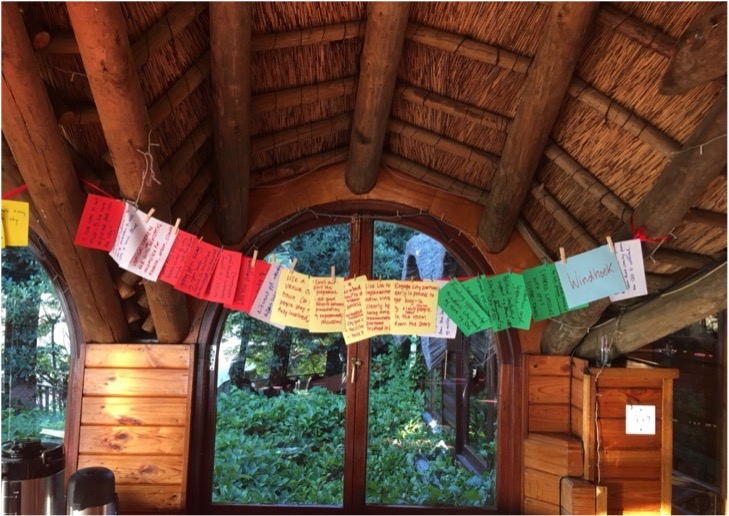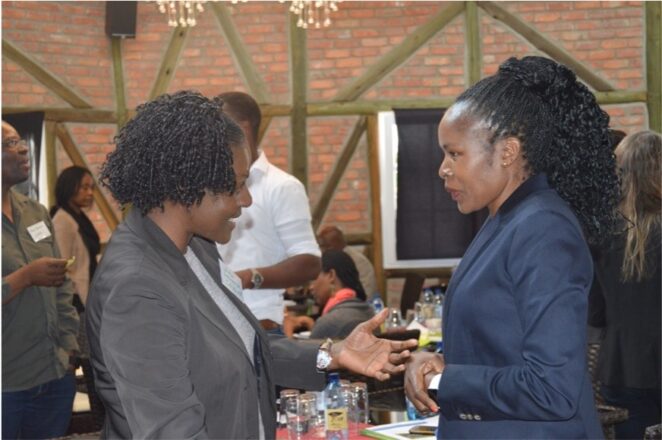FRACTAL Principles

Introduction
During the FRACTAL project, transdisciplinary learning processes were implemented that aimed to support climate resilient development in nine southern African cities. These processes resulted in several lessons for research and society, particularly with regard to working towards inclusive, contextual, and proactive climate research and action.
This article provides an overview of the principles developed from the FRACTAL project.
*This weADAPT article is an abridged version of the original text, which can be downloaded from the right-hand column. Please access the original text for research purposes, full references, or to quote text.
Methods
The team brainstormed principles that underpinned climate resilience work in the project. Evidence from the programme was qualitatively analysed using the principles as a framework to uncover the mindsets and practices that supported ‘the FRACTAL approach.’
The Twelve Principles
1. Respect & Trust: Listen to one another, support emotional connection and have respectful conversations
- Commit time to investing in relationships.
- Design activities to foster understanding of one another, and find common problems and areas of interest.
- Maintain transparency with regards to intentions of different partners and what is (or is not) possible.
- Allow emotions to surface to support the complexity of interpreting and using climate science in a way that is meaningful.
2. Bigger Picture Thinking:Acknowledge that risks related to climate variability and change result from multiple interconnected drivers
- Include a variety of stakeholders – different groups of people hold knowledge about the drivers of climate risk.
- Humbly present climate knowledge as connected to a wider view.
- Meet frequently and preferably face-to-face to “join up the dots”.
- Exchange knowledge amongst participants to facilitate the development of a holistic understanding of climate information, context, baseline challenges, city goals, potential development pathways and decision-making processes.
3. Treating in Context:View and treat entities (cities) in their wider context so as to connect current challenges with future planning.
- A context led approach to problem exploration and solution generation allows researchers to discern the climate challenges, decision-making scenarios, and national-regional priorities.
- An inclusive, collaborative learning lab approach helps to develop and fast track an understanding of city contexts and to surface lots of perspectives.
- Include activities and dialogue that allow for surfacing of information that is not documented.
4. The Social Element:Include activities and events that support socialising, bonding and having fun so participants can connect as people.
- Initiate activities and events that encourage socialising. Bonding supports the development of a shared desire to collectively solve problems.
- Create opportunities to learn in less formal ways and in different spaces, encouraging people to ask questions and to spark different modes of thinking.
- Engage with humor and fun in learning processes.
5. Catalyse African Agency: Work towards African-owned solutions, based on local research and capacity.
- Focus on flexibility, iteration and emergence so that contextual needs can emerge and are not imposed from outside. International researchers acknowledge their (lesser) role alongside local researchers and decision makers.
- Support existing/emerging climate ‘champions’ and local problem-solving as well as the mainstreaming of climate knowledge.
- Encourage commitment from stakeholders to take ideas forward after a project has ended.
6. Neutral Space & Enabling Process:Well designed programme and well planned process to support cohesion, coordination and effectiveness.
- Use third, neutral or ‘safe’ spaces for engagements with sensitive facilitators so people are able to challenge ideas without being reprimanded.
- Design activities to encourage active learning and to value listening as much as talking. Maintain the core agenda while allowing for flexibility and iteration.
- Foster relationships between different stakeholders to support learning and collaboration beyond a project’s lifetime.

7. Proces-Driven Iteration:Set some explicit overarching goals, but aim to generate methods and outcomes through iterative processes.
- Aim to develop context-led, holistic contributions towards usable knowledge.
- Support processes that can absorb changes and spontaneity (based on needs), recognising the need for ongoing adaptation, and open to iteration.
8. (Un)comfortable Differences:Welcome complexity, open-mindedness and be comfortable with different ideas, values, inputs and processes.
- Seek to create safe, constructive dialogue by embracing diverse perspectives and learning styles. Allow for moments of discomfort.
- Accept differences and contradictions between evidence-based science and complex social dynamics in the decision-making realm in order to foster common ground and terminology.
- Move away from a siloed, homogeneous science approach towards a heterogeneous, transdisciplinary approach for forward-looking dynamic co-exploration.
9. Inclusivity & Collaboration:Acknowledge the value of all stakeholders, appreciate all input, co-explore knowledge and co-produce solutions.
- Enable participatory dialogues by: valuing diversity; using accessible language; creating common ground and showing the importance of collaboration; attempting to remove the power of single dominant knowledge holders; grounding conversations in the real world with which participants can engage; and utilising diverse methods for different voices and information to emerge.
- Aim to create a dynamic space for knowledge exchange and solution generation by bridging the gap between researchers, decision makers and other city stakeholders. Demonstrate the common ground between mandates and the value of collaboration.
10. Link Current, Past & Future:Reflect on past experiences, current trends and case studies for learning, adapting and future visioning of development pathways.
- Establish connecting current challenges with future planning as a core project objective.
- Integrate past experiences, key themes in similar case studies, current city-specific objectives, and future trends with an eye to exploring options for future sustainability.
- Create a culture of reflective enquiry within learning processes. This is important for inclusive and extensive problem solving.
11. Networks & Relationships:Building networks and relationships across spaces, skill sets, synergies and expertise.
- Establish platforms for communication and developing interpersonal relationships. Also foster relational skills, working in different ways with different people.
- Develop regional networks by connecting researchers, decision makers and stakeholders.
12. Embedded Researchers:Pronounced role of early career embedded researchers within local city governments to bridge science and decision-making.
- Embedded researchers (ERs) work as knowledge intermediaries and use their skills, passions and networks to link climate change information with local priorities in city decision-making contexts.
- ERs bridge siloes, build relationships and connect researchers with city stakeholders for maintaining engagement, building capacity within institutions and harnessing receptivity towards climate information.
Suggested Citation:
‘Fractal Principles Factsheet’ (2021), FRACTAL Project.
Related resources
- Principles for co-producing climate services: practical insights from FRACTAL
- Embracing the uncomfortable silences in climate information exchange
- Receptivity and judgement: expanding ways of knowing the climate to strengthen the resilience of cities
- An Embedded Researcher approach to integrate climate information into decision making in southern African cities: lessons from F
- FRACTAL Learning - Adaptation Inspiration Theme Module 1
- Dialogue for decision-making: unpacking the ‘City Learning Lab’ approach
- Building Resilience in African Cities: A Think Piece
- FRACTAL: Future Resilience for African Cities and Lands
(0) Comments
There is no content